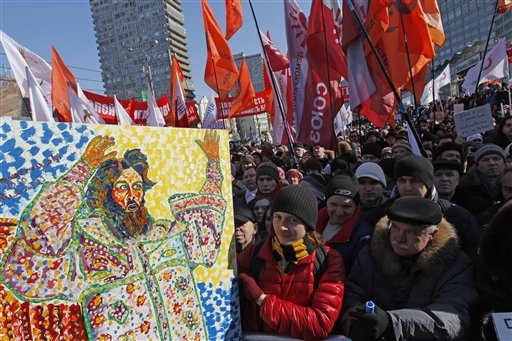
MOSCOW (AP) — A protest rally against Vladimir Putin has drawn more than 20,000 people, far fewer than those in past months as the opposition movement appears to be losing momentum following Putin's presidential election victory.
Speeches by young activists like 27-year-old Maxim Kats, however, showed that some of the new political energy that has emerged in Russia in recent months is being channeled into local politics and civic activism. Kats and two others in their 20s, who just won seats on municipal councils, were among a number of speakers who called on Muscovites to get involved in how their city is run, starting with their own neighborhoods.
Putin, who was Russia's president from 2000 to 2008 and then moved into the prime minister's office to avoid a constitutional ban on more than two consecutive terms, won a third term in the March 4 election with 64 percent of the vote. Because of a change in the length of the presidential term, he is set to return to the Kremlin for six years and would be eligible to run for six more.
His decision to return to the presidency infuriated opposition activists who have grown tired of his heavy-handed rule. A December parliamentary election that was manipulated to bolster Putin's party angered many ordinary Russians and swelled opposition ranks.
Protests held after December's vote attracted up to 100,000 people in the largest show of discontent in Russia's post-Soviet history. On Saturday, the smaller crowd, surrounded by hundreds of troops and security forces, chanted: "We are the power," ''This is our country" and "Putin is a thief."
Although violations in the presidential election were numerous, observers said it was fairer than the parliamentary election and Putin clearly won.
The protesters said they did not recognize the results. "These weren't elections. This isn't a president," read a banner over a stage set up on Novy Arbat, a wide avenue in central Moscow.
Opposition leader Garry Kasparov echoed that sentiment. "This was not an election," Kasparov, a former world champion chess player, said from the stage. "This was a special operation run by a thug who wanted to return to the Kremlin."
Russian actor Maksim Vitorgan, who was among thousands of people who volunteered to monitor the presidential vote, said he saw so many people casting multiple ballots, known as carousel voting, that "an amusement park would be envious."
"We know the truth, but what are we supposed to do with it?" Vitorgan said, voicing widespread concern that the opposition movement is losing its voice.
The volunteer vote monitors were one new burst of civic activism. Another was the hundreds of people who ran for seats on Moscow's 125 municipal councils on March 4 as part of a new movement called Our City.
Kats, a former professional poker player, was among 71 who won seats despite what some candidates said was heavy official pressure to keep them off the ballot or steal their votes. The majority of those who won were in their 20s, 30s and 40s.
"If I did it, it means anyone can," Kats told the crowd after describing how he had ignored advice to cut his hair, change his Jewish last name and wear a suit.
Speaking after the rally, he said he would concentrate on making the city a better place to live, with nicer playgrounds and more pedestrian crossings.
Maxim Motin, 28, is another member of what has been called the new political class. He used his blog to help communicate with voters before the election and has suggested setting up an online community forum to discuss ideas for improving the neighborhood.
Masha Lipman, a scholar at the Carnegie Moscow Center who attended the rally, described the grassroots effort to win seats on the municipal councils as a societal change and said she was confident there will be more civic initiatives in the months and years ahead.
"What to me is extremely interesting is that something clicked and people overcame their cynicism," she said. "This was amazing."
A variety of new civic groups also took part in the rally, distributing literature or soliciting signatures for petitions to advance their causes.
The protest movement has been concentrated in Moscow, where Putin failed to win a majority of the votes and even came in second in some neighborhoods. Most of the protesters are white-collar professionals and students.
The numbers may have been down Saturday in part because it was the third day of a national holiday and many people had left town.
Mikhail Solontsev, a 19-year-old student, who has taken part in opposition protests since December, said the pressure on Putin remains high. "It depends on us whether he will step down or not, but he's already scared of us," Solontsev said.
Opposition leaders, however, gave no sense that they have a clear plan going forward. They also will struggle to maintain the unity of a movement that has brought together liberals, leftists and nationalists.
The protest ended peacefully, but leftist leader Sergei Udaltsov and two of his followers were detained afterward as they tried to march to nearby Pushkin Square. Since the presidential election, Udaltsov has returned to the confrontational approach of last year, when he spent a total of almost three months in jail as a result of defying city bans or restrictions on his protests. Udaltsov was released later Saturday, but faces charges that could send him to jail for 15 days.
Police also detained about 25 nationalists who broke away from the crowd at the start of the rally and tried to march.
In St. Petersburg, police detained some 40 people out of several hundred who took part in an unsanctioned rally.